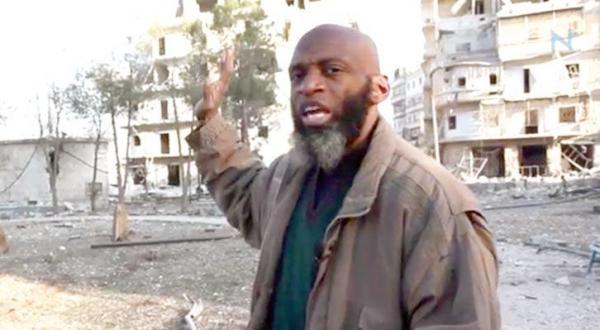Beirut – On a stretch of road in northern Syria, a missile screamed from the sky and obliterated a car, killing a militant and leaving a wreck of twisted metal in an olive grove.
Soon after, a skinny, bald and bearded African-American convert to Islam and former stand-up comedian from New York arrived to document the scene.
Addressing a video camera with thinly veiled outrage, Bilal Abdul Kareem showed missile fragments that he said indicated an American drone strike, adding that it had put children who were playing nearby into the hospital.
“Some people here don’t think that that was a good idea,” he said of the strike, asking whether there was “open warfare” on Syrians as long as countries like the United States could “get their man.”
The report from January was one of hundreds that Abdul Kareem has made inside Syria in recent years, building his reputation as a unique voice covering the war from rebel-held areas that other Western journalists have fled for fear of kidnapping and beheading by extremists.
Along the way, Abdul Kareem has interviewed foreign fighters from Britain, Arab countries and elsewhere and survived the siege of eastern Aleppo by regime forces last year.
While he harshly criticizes the ISIS militants, he has done extensive interviews with members of the Syria affiliate of Al-Qaeda. In one, Abdul Kareem explains why joining the fight in Syria is a religious obligation and says that fighters in Syria are “the first line of defense” against the Shi’ites.
Such interviews have led critics to brand Abdul Kareem an extremist propagandist.
The Syrian regime and its Russian allies say he cavorts with terrorists. Although the United States has taken no public stance on his work, terrorism analysts say he provides an uncritical, English-language platform for extremists.
“It is the soft approach, the sugarcoated approach,” said Alberto M. Fernandez, a former top counterterrorism official at the State Department and now vice president of the Middle East Media Research Institute.
That played into the strategy of Syria’s Qaeda affiliate, the Nusra Front, to blend in with the wider rebel movement by changing its name, announcing a break with Al-Qaeda and merging with other factions — moves that have not convinced the United States that the group has changed, Mr. Fernandez said.
“But to the broader world, inside of Syria and on social media, there is an effort to reinvent them as kinder, gentler extremists,” he said, adding that Abdul Kareem was part of that effort.
Abdul Kareem begged to differ.
When I contacted him about his work, he jokingly suggested that I drop by for dinner — at his place in northern Syria.
In a series of Skype interviews, he discussed his work and explained how he had grown from a churchgoing kid in Mount Vernon, N.Y. into an unlikely correspondent in a Middle Eastern war.
He insisted that he was an independent journalist who belonged to no militant group, opposed violence against civilians and did not bear arms.
“Do you think this war needs one more black guy with no hair on his head blasting with a Kalashnikov?” he asked, laughing.
But he acknowledged that he speaks with members of Syria’s extremist factions, including Al-Qaeda, to provide Western audiences with a window into their views.
Too often, he said, the West dismisses fighters as “terrorists” without understanding what motivates them. That has locked the two sides in an endless, “lose-lose” battle, he said, which he believes can be solved only through dialogue.
He acknowledged that such an initiative was a long shot — especially with President Trump in the White House. Trump has called for stepping up the war with what he calls “radical Islamic terrorism.”
“I can have these conversations with Al-Qaeda members, and sometimes you convince them and sometimes they are not convinced,” he said. “I wonder how welcome I would be if I walked into Washington and said, ‘Hey guys, I want to talk to you about Al-Qaeda.’ I wonder if I would get the same tea with one spoonful of sugar in it.”
Abdul Kareem was born Darrell Lamont Phelps and raised by his mother in Mount Vernon. A 1988 yearbook photo from his high school shows a grinning young man in a tuxedo and bow tie.
As Abdul Kareem tells it, he moved to New York City, where he dabbled in music, theater and stand-up comedy before converting to Islam, attracted to its conception of God and its emphasis on clean living.
He decided to study Arabic so he could read Islamic scriptures for himself and traveled to Sudan before settling in Egypt. There he got a job presenting an English-language religion program on a Saudi-funded television station, but he fell out with the channel’s management over his interest in Syrian affairs and quit. He later made documentaries in Libya, Rwanda and elsewhere for a channel in Britain.
